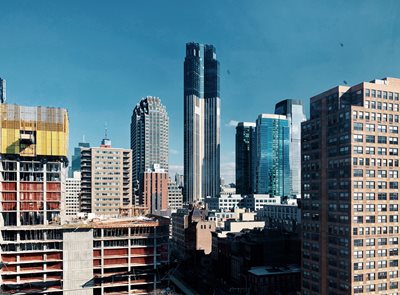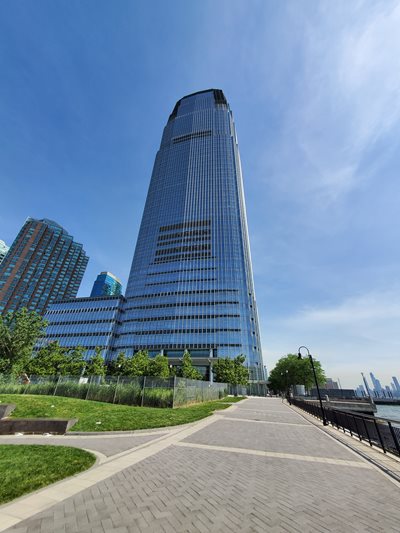Article Index
- About The Organization
- How Rules, Regulations and Permits Are Created
- Important Ordinances Created by the Jersey City Building Department
- Connect With Us To Receive Support
About The Organization
The Jersey City Building Department is an organization tasked with creating Jersey City’s building policies, high-rise laws, ordinances and other regulations. The organization is empowered by the Jersey City Municipal code to:
- Administer and enforce the State Uniform Construction Code and conduct the centralized issuance of permits and inspection services.
- The condemnation of properties in accordance with N.J.S.A. 40:48-2.3 et seq./li>
- Issue permits for alterations, additions, new buildings, and inspections both before and after occupancy is permitted.
- Conduct ongoing inspections of elevators, swimming pools, backflow preventers.
- Register non-state licensed contractors.
As a board, it is imperative for HOA board members to stay aligned and keep localized HOA ordinances and regulations in mind when creating the goals and vision of a community.
For some helpful hints on board alignment and how to stay on the same page with your fellow board members, watch the video above!
Similar to other business, companies and organizations, Jersey City HOA regulations bind property management companies through specific policies and concrete legal parameters. As the leader in the property management industry, FirstService Residential is committed to helping you board members familiarize themselves with these community management, high-rise and HOA ordinances to better protect and serve your community.
As a board member, it is imperative for board members to stay aligned and keep HOA ordinances and regulations in mind when creating the goals and vision of a community.
How Rules, Regulations and Permits are Created
As mentioned above, this department is responsible for the administration of zoning and property maintenance regulations, as well as the issuance of building permits.
General overviews of these areas are as follows:
Building Permits
Building permits are issued in accordance with the New Jersey Uniform Construction Code. All required forms are available at the main office. Building permits are created and distributed by the department and are issued at the local level in the state, so you will need to file your permit application with the Building Department. In order for your permit to be issued, your project will need to meet all state and local building codes and regulations.
Zoning Permits
Zoning permits are required for the following; New Home, Addition and/or alteration, Deck, Pool, Fence, Shed, Driveway Expansion, high-rise or other property updates within the city. The Zoning Officer is in charge of working with building managers and keeping ordinances in compliance. Any questions or issues pertaining to the uses of property, parking requirements, setbacks, height and other zoning matters can be answered by this official.
The owner of any vacant property as defined by Ordinance 5440 shall, within 14 calendar days after the building becomes vacant property or within 14 calendar days after assuming ownership of the vacant property, whichever is later; or within 14 calendar days of notice by the municipality, file a registration statement for such vacant property with the Construction Code Official.
Property Maintenance
Property maintenance inspectors ensure that residents and businesses maintain their properties in compliance with township ordinances. All problems or questions in this area can be directed to the Building Department for an immediate response from inspectors.
All of the documents for the aforementioned process can be found on the Jersey City Building Department’s website here.
Important Ordinances Created By the Jersey City Building Department
As a board member, there are many permits, ordinances and other regulations you should familiarize yourself to save yourself legal headaches down the road and ensure the safety of your residents. However, here are a few really important ones to know and understand.
Jersey City High-Rise Ordinance 21-054

One of the newest and most important ordinances passed by the Jersey City Building department is high-rise ordinance 21-054.
Recently, Mayor Steven M. Fulop announced new legislation to increase safety requirements for structural and facade inspections of all high-rise buildings to better protect residents. The enhanced mandates require ongoing inspections at a minimum of every five years for façade inspections and every ten years for structural inspections. The new safety protocols are in direct response to the tragic collapse of the Champlain Tower in Surfside, Florida, which may have been preventable.
According to a press release issued by the mayor’s office in July 2021: "Following the tragic collapse of the Champlain Tower in Surfside, Florida, we've been re-examining the local policies that exist in both the city and New Jersey to protect our residents that live in older high-rise structures, as we certainly have the most in the State," said Mayor Fulop. "Since the sad news from Florida, we've had residents in several buildings reach out with the knowledge that their condo boards are delaying work because of the potential cost to residents. There aren't many policies in the State to protect in this area, so we'll be introducing some locally at the next City Council meeting."
The new legislation amends the city’s Property Maintenance Codes to strengthen the requirements set forth for all residential and non-residential building owners and managers to ensure buildings are adequately maintained and structurally sound.
The amendments address both interior and exterior safety requirements, as follows:
- Structural inspections – All concrete residential and commercial buildings above six stories must perform a visual structural inspection by a licensed third-party engineer at least every ten years. The inspection shall include but not be limited to structural foundations, balconies, any appurtenant structures, all structural members, and waterproofing conditions. A licensed architect or engineer must subsequently prepare a structural report and provide it to the City's Division of Construction Code Official.
- Façade inspections - Owners of buildings above six stories or with masonry facades of four stories or more must have exterior walls and appurtenances inspected every five years. Additionally, a technical façade report must be submitted to the Division of the Construction Code.
Failure to comply with these requirements will subject the building owners to fines and penalties.
Due to the fact that the city has the most high-rise buildings than any other municipality throughout the state, with various building structures and ages, the goal is to strengthen policies in order to provide the best protection for our residents and the community at large.

Ordinance 21-054 requires periodic structural and façade inspections and repairs of multi-story buildings
This ordinance requires that all concrete buildings more than six stories tall undergo a visual structural inspection every 10 years by a licensed architect or engineer. This inspection requires the examination of foundations, balconies, all structural members and waterproofing and must be conducted in accordance with rules promulgated by the Jersey City Construction Code Official or their designee. In accordance with this ordinance, the initial inspection must be performed by December 31, 2022 and thereafter, by December 31 of each year in which an inspection is mandated. The building owner (condominium associations, cooperative associations and HOAs) is responsible for having the inspection done and paying for it.
The ordinance requires a property owner to submit a written Structural Inspection Report prepared by a licensed architect or engineer to the Division of the Construction Code Official within 30 days of the inspection. The report must certify the inspection results, clearly document the condition of the building’s structure, noting if conditions are safe or unsafe; and provide repair and maintenance recommendations. If applicable, it must include information on which repairs are urgent and a timeline for all repairs must be submitted. If the report indicates a need for structural repairs, the owner is responsible for all repairs and must immediately undertake the repairs required to secure public safety. In addition, the ordinance requires a façade inspection every five years by a licensed architect or engineer. These inspections are required for all buildings that are either more than six stories or consist of a masonry façade and are four or more stories.
The penalty for violating any provision of the ordinance is a fine of up to $2,000; and/or jail time of up to 90 days; and/or community service for up to 90 days. Your management team should be poised to work with your association’s professionals to help ensure compliance.
Other Ordinances to Familiarize Yourself With
Ordinance 345-42. R-3 Multi-Family Mid-Rise District
Purpose
1.The purpose of the multi-family mid-rise district is to provide for a broad range of multi-family housing in areas served by arterial streets, mass transit, neighborhood commercial uses and community facilities.
2.The purpose of this zone is to relate the building to the street and not create the type of development that centers the tower in a sea of parking, disconnecting the building from the street.
3.The multi-family mid-rise district contains mid-rise buildings of three to eight stories.
Ordinance 345-43. - R-4 Multi-Family High-Rise District
Purpose
1. The purpose of the multi-family high-rise district is to accommodate low, medium and high-rise multi-family housing in appropriate locations that are served by mass transit, off-street parking and adequate public infrastructure. The location of these districts in close proximity to shopping, employment and recreational amenities is intended to promote an increased mix of uses, twenty-four (24) hour activity and pedestrian traffic characteristic of dense urban centers.
2.This district should not create a "tower in the park," type of development. This type of development centers the tower in a sea of parking disconnecting the building from the street.
Permitted principal uses are as follows:
- Townhouses.
- Mid-rise apartments.
- High-rise apartments.
- Schools.
- Parks and playgrounds.
- Essential services.
- Governmental uses.
- Houses of worship.
- Retail sates of goods and services and offices as part of the ground floor of high-rise apartment buildings.
- Assisted living residences.
- Nursing homes.
- Senior housing.
Ordinance 345-44. - R-5 Low Rise Residential, Mixed Use Zone
Purpose
The purpose of this district is to provide development regulations contextual to the existing predominantly two- to four-story multifamily neighborhood with occasional retail venues. Moreover, the intent of the zoning regulations are to protect the historically low-rise nature of the neighborhood from inappropriate infill such as: buildings greater than four (4) stories, detached buildings, front yard parking, and ground floor garages on lots smaller than four thousand (4,000) square feet. Additionally, the purpose of the zoning in this district is to address and mitigate the impact the flooding in low laying vulnerable areas, and create a more resilient neighborhood for future generations.
You can review the full Codification of the General Ordinances here.
Connect With Us To Receive Support

Understanding how the Jersey City Building Department operates, along with the regulations that they create and uphold for your association can come as a challenge. Considering the importance of understanding this organization and abiding by their policies and ordinances, though, all HOAs, high-rise buildings and other property boards must make an effort to remain informed. If your HOA board finds it difficult, perhaps it is time to outsource the job to a trusted HOA management company.
You can look to us for all your property management needs, including:
- Preventative maintenance programs to increase longevity, effectiveness and cost-efficiency of building systems and equipment.
- Custom Emergency and Asset Manuals.
- Frequent property inspections and implementation of a work order system using mobile technology.
- Management systems for amenity reservations, visitors, even package tracking.
- Transparent accounting and financial services, including leveraged buying power for cost containment.
- Dedicated service to Board members, owners and residents through customer-focused associates and our 24/7 customer care center.
- Training, development and supervision of on-site personnel.
As one of the leading property management companies in the state – coupled with the depth of resources and local knowledge of various areas throughout New Jersey, FirstService Residential provides end-to-end property management solutions custom fitted to your community association’s individual needs.
Communicating the latest legislation from the Jersey City Building Department, as well as other policies impacting the boards, residents and industry we serve is always our top priority.
Contact us online to connect with one of our local property management specialists today to learn more!